- Home
- Arthur Miller
The Price
The Price Read online
ARTHUR MILLER
The Price
A PLAY
PENGUIN BOOKS
Contents
Characters
Act One
Act Two
AUTHOR’S PRODUCTION NOTE
PENGUIN MODERN CLASSICS
The Price
Arthur Miller was born in New York City in 1915 and studied at the University of Michigan. His plays include All My Sons (1947), Death of a Salesman (1949), The Crucible (1953), A View From the Bridge and A Memory of Two Mondays (1955), After the Fall (1964), Incident at Vichy (1965), The Price (1968), The Creation of the World and Other Business (1972), and The American Clock (1980). He has also written two novels, Focus (1945) and The Misfits, which was filmed in 1960, and the text for In Russia (1969), In the Country (1977), and Chinese Encounters (1979), three books of photographs by Inge Morath. His most recent works include a memoir, Timebends (1987), the plays The Ride Down Mt. Morgan (1991), The Last Yankee (1993), Broken Glass (1994), and Mr. Peters’ Connections (1999), Echoes Down the Corridor: Collected Essays, 1944–2000, and On Politics and the Art of Acting (2001). He has twice won the New York Drama Critics Circle Award, and in 1949 he won the Pulitzer Prize. He was the recipient of the National Book Foundation 2001 Medal for Distinguished Contribution to American Letters, he was awarded with the prize Prince of Asturias of Letters in 2002, and in 2003 was awarded the Jerusalem Prize. He died in 2005.
For Inge and Rebecca
Characters
VICTOR FRANZ
ESTHER FRANZ
GREGORY SOLOMON
WALTER FRANZ
Act One
Today. New York.
Two windows are seen at the back of the stage. Daylight filters through their sooty panes, which have been X’d out with fresh whitewash to prepare for the demolition of the building.
Now daylight seeps through a skylight in the ceiling, grayed by the grimy panes. The light from above first strikes an overstuffed armchair in center stage. It has a faded rose slipcover. Beside it on its right, a small table with a filigreed radio of the Twenties on it and old newspapers; behind it a bridge lamp. At its left an old wind-up Victrola and a pile of records on a low table. A white cleaning cloth and a mop and pail are nearby.
The room is progressively seen. The area around the armchair alone appears to be lived-in, with other chairs and a couch related to it. Outside this area, to the sides and back limits of the room and up the walls, is the chaos of ten rooms of furniture squeezed into this one.
There are four couches and three settees strewn at random over the floor; armchairs, wingbacks, a divan, occasional chairs. On the floor and stacked against the three walls up to the ceiling are bureaus, armoires, a tall secretary, a breakfront, a long, elaborately carved serving table, end tables, a library table, desks, glass-front bookcases, bow-front glass cabinets, and so forth. Several long rolled-up rugs and some shorter ones. A long sculling oar, bedsteads, trunks. And overhead one large and one smaller crystal chandelier hang from ropes, not connected to electric wires. Twelve dining-room chairs stand in a row along a dining-room table at left.
There is a rich heaviness, something almost Germanic, about the furniture, a weight of time upon the bulging fronts and curving chests marshalled against the walls. The room is monstrously crowded and dense, and it is difficult to decide if the stuff is impressive or merely over-heavy and ugly.
An uncovered harp, its gilt chipped, stands alone downstage, right. At the back, behind a rather makeshift drape, long since faded, can be seen a small sink, a hotplate, and an old icebox. Up right, a door to the bedroom. Down left, a door to the corridor and stairway, which are unseen.
We are in the attic of a Manhattan brownstone soon to be torn down.
From the down-left door, Police Sergeant Victor Franz enters in uniform. He halts inside the room, glances about, walks at random a few feet, then comes to a halt. Without expression, yet somehow stilled by some emanation from the room, he lets his gaze move from point to point, piece to piece, absorbing its sphinxlike presence.
He moves to the harp with a certain solemnity, as toward a coffin, and, halting before it, reaches out and plucks a string. He turns and crosses to the dining-room table and removes his gun belt and jacket, hanging them on a chair which he has taken off the table, where it had been set upside down along with two others.
He looks at his watch, waiting for time to pass. Then his eye falls on the pile of records in front of the phonograph. He raises the lid of the machine, sees a record already on the turntable, cranks, and sets the tone arm on the record. Gallagher and Shean sing. He smiles at the corniness.
With the record going he moves to the long sculling oar which stands propped against furniture and touches it. Now he recalls something, reaches in behind a chest, and takes out a fencing foil and mask. He snaps the foil in the air, his gaze held by memory. He puts the foil and mask on the table, goes through two or three records on the pile, and sees a title that makes him smile widely. He replaces the Gallagher and Shean record with this. It is a Laughing Record—two men trying unsuccessfully to get out a whole sentence through their wild hysteria.
He smiles. Broader. Chuckles. Then really laughs. It gets into him; he laughs more fully. Now he bends over with laughter, taking an unsteady step as helplessness rises in him.
Esther, his wife, enters from the down-left door. His back is to her. A half-smile is already on her face as she looks about to see who is laughing with him. She starts toward him, and he hears her heels and turns.
ESTHER: What in the world is that?
VICTOR, surprised: Hi! He lifts the tone arm, smiling, a little embarrassed.
ESTHER: Sounded like a party in here!
He gives her a peck.
Of the record: What is that?
VICTOR, trying not to disapprove openly: Where’d you get a drink?
ESTHER: I told you. I went for my checkup. She laughs with a knowing abandonment of good sense.
VICTOR: Boy, you and that doctor. I thought he told you not to drink.
ESTHER—laughs: I had one! One doesn’t hurt me. Everything’s normal anyway. He sent you his best. She looks about.
VICTOR: Well, that’s nice. The dealer’s due in a few minutes, if you want to take anything.
ESTHER, looking around with a sigh: Oh, dear God—here it is again.
VICTOR: The old lady did a nice job.
ESTHER: Ya—I never saw it so clean. Indicating the room: Make you feel funny?
VICTOR—shrugs: No, not really—she didn’t recognize me, imagine?
ESTHER: Dear boy, it’s a hundred and fifty years. Shaking her head as she stares about: Huh.
VICTOR: What?
ESTHER: Time.
VICTOR: I know.
ESTHER: There’s something different about it.
VICTOR: No, it’s all the way it was. Indicating one side of the room: I had my desk on that side and my cot. The rest is the same.
ESTHER: Maybe it’s that it always used to seem so pretentious to me, and kind of bourgeois. But it does have a certain character. I think some of it’s in style again. It’s surprising.
VICTOR: Well, you want to take anything?
ESTHER, looking about, hesitates: I don’t know if I want it around. It’s all so massive … where would we put any of it? That chest is lovely. She goes to it.
VICTOR: That was mine. Indicating one across the room: The one over there was Walter’s. They’re a pair.
ESTHER, comparing: Oh ya! Did you get hold of him?
VICTOR—rather glances away, as though this had been an issue: I called again this morning—he was in consultation.
ESTHER: Was he in the office?
VICTOR: Ya. The nurse went and talked to him for a minute—it doesn�
�t matter. As long as he’s notified so I can go ahead.
She suppresses comment, picks up a lamp.
That’s probably real porcelain. Maybe it’d go in the bedroom.
ESTHER, putting the lamp down: Why don’t I meet you somewhere? The whole thing depresses me.
VICTOR: Why? It won’t take long. Relax. Come on, sit down; the dealer’ll be here any minute.
ESTHER, sitting on a couch: There’s just something so damned rotten about it. I can’t help it; it always was. The whole thing is infuriating.
VICTOR: Well, don’t get worked up. We’ll sell it and that’ll be the end of it. I picked up the tickets, by the way.
ESTHER; Oh, good. Laying her head back: Boy, I hope it’s a good picture.
VICTOR: Better be. Great, not good. Two-fifty apiece.
ESTHER, with sudden protest: I don’t care! I want to go somewhere. She aborts further response, looking around. God, what’s it all about? When I was coming up the stairs just now, and all the doors hanging open … It doesn’t seem possible …
VICTOR: They tear down old buildings every day in the week, kid.
ESTHER: I know, but it makes you feel a hundred years old. I hate empty rooms. She muses. What was that screwball’s name?—rented the front parlor, remember?—repaired saxophones?
VICTOR, smiling: Oh—Saltzman. Extending his hand sideways: With the one eye went out that way.
ESTHER: Ya! Every time I came down the stairs, there he was waiting for me with his four red hands! How’d he ever get all those beautiful girls?
VICTOR—laughs: God knows. He must’ve smelled good.
She laughs, and he does.
He’d actually come running up here sometimes; middle of the afternoon—“Victor, come down quick, I got extras!”
ESTHER: And you did, too!
VICTOR: Why not? If it was free, you took it
ESTHER, blushing: You never told me that.
VICTOR: No, that was before you. Mostly.
ESTHER: You dog.
VICTOR: So what? It was the Depression.
She laughs at the non sequitur.
No, really—I think people were friendlier; lot more daytime screwing in those days. Like the McLoughlin sisters—remember, with the typing service in the front bedroom? He laughs. My father used to say, “In that typing service it’s two dollars a copy.”
She laughs. It subsides.
ESTHER: And they’re probably all dead.
VICTOR: I guess Saltzman would be—he was well along Although—He shakes his head, laughs softly in surprise. Jeeze, he wasn’t either. I think he was about … my age now. Huh!
Caught by the impact of time, they stare for a moment in silence.
ESTHER—gets up, goes to the harp: Well, where’s your dealer?
VICTOR, glancing at his watch: It’s twenty to six. He should be here soon.
She plucks the harp.
That should be worth something.
ESTHER: I think a lot of it is. But you’re going to have to bargain, you know. You can’t just take what they say …
VICTOR, with an edge of protest: I can bargain; don’t worry, I’m not giving it away.
ESTHER: Because they expect to bargain.
VICTOR: Don’t get depressed already, will you? We didn’t even start. I intend to bargain, I know the score with these guys.
ESTHER—withholds further argument, goes to the phonograph; firing up some slight gaiety: What’s this record?
VICTOR: It’s a Laughing Record. It was a big thing in the Twenties.
ESTHER, curiously: You remember it?
VICTOR: Very vaguely. I was only five or six. Used to play them at parties. You know—see who could keep a straight face. Or maybe they just sat around laughing; I don’t know.
ESTHER: That’s a wonderful idea!
Their relation is quite balanced, so to speak; he turns to her.
VICTOR: You look good.
She looks at him, an embarrassed smile.
I mean it.—I said I’m going to bargain, why do you …?
ESTHER: I believe you.—This is the suit.
VICTOR: Oh, is that it! And how much? Turn around.
ESTHER, turning: Forty-five, imagine? He said nobody’d buy it, it was too simple.
VICTOR, seizing the agreement: Boy, women are dumb; that is really handsome. See, I don’t mind if you get something for your money, but half the stuff they sell is such crap … Going to her: By the way, look at this collar. Isn’t this one of the ones you just bought?
ESTHER, examining it: No, that’s an older one.
VICTOR: Well, even so. Turning up a heel: Ought to write to Consumers Union about these heels. Three weeks—look at them!
ESTHER: Well, you don’t walk straight.—You’re not going in uniform, I hope.
VICTOR: I could’ve murdered that guy! I’d just changed, and McGowan was trying to fingerprint some bum and he didn’t want to be printed; so he swings out his arm just as I’m going by, right into my container.
ESTHER, as though this symbolized: Oh, God …
VICTOR: I gave it to that quick cleaner, he‘ll try to have it by six.
ESTHER: Was there cream and sugar in the coffee?
VICTOR: Ya.
ESTHER: He’ll never have it by six.
VICTOR, assuagingly: He’s going to try.
ESTHER: Oh, forget it.
Slight pause. Seriously disconsolate, she looks around at random.
VICTOR: Well, it’s only a movie …
ESTHER: But we go out so rarely—why must everybody know your salary? I want an evening! I want to sit down in a restaurant without some drunken ex-cop coming over to the table to talk about old times.
VICTOR: It happened twice. After all these years, Esther, it would seem to me …
ESTHER: I know it’s unimportant—but like that man in the museum; he really did—he thought you were the sculptor.
VICTOR: So I’m a sculptor.
ESTHER, bridling: Well, it was nice, that’s all! You really do, Vic—you look distinguished in a suit. Why not? Laying her head back on the couch: I should’ve taken down the name of that scotch.
VICTOR: All scotch is chemically the same.
ESTHER: I know; but some is better.
VICTOR, looking at his watch: Look at that, will you? Five-thirty sharp, he tells me. People say anything. He moves with a heightened restlessness, trying to down his irritation with her mood. His eye falls on a partly opened drawer of a chest, and he opens it and takes out an ice skate. Look at that, they’re still good! He tests the edge with his fingernail; she merely glances at him. They’re even sharp. We ought to skate again sometime. He sees her unremitting moodiness. Esther, I said I would bargain!—You see?—you don’t know how to drink; it only depresses you.
ESTHER: Well, it’s the kind of depression I enjoy!
VICTOR: Hot diggity dog.
ESTHER: I have an idea.
VICTOR: What?
ESTHER: Why don’t you leave me? Just send me enough for coffee and cigarettes.
VICTOR: Then you’d never have to get out of bed.
ESTHER: I’d get out. Once in a while.
VICTOR: I got a better idea. Why don’t you go off for a couple of weeks with your doctor? Seriously. It might change your viewpoint.
ESTHER: I wish I could.
VICTOR: Well, do it. He’s got a suit. You could even take the dog—especially the dog. She laughs. It’s not funny. Every time you go out for one of those walks in the rain I hold my breath what’s going to come back with you.
ESTHER, laughing: Oh, go on, you love her.
VICTOR: I love her! You get plastered, you bring home strange animals, and I “love” them! I do not love that goddamned dog!
She laughs with affection, as well as with a certain feminine defiance.
ESTHER: Well, I want her!
VICTOR—pause: It won’t be solved by a dog, Esther. You’re an intelligent, capable woman, and you can’t lay around all day
. Even something part-time, it would give you a place to go.
ESTHER: I don’t need a place to go. Slight pause. I’m not quite used to Richard not being there, that’s all.
VICTOR: He’s gone, kid. He’s a grown man; you’ve got to do something with yourself.
ESTHER: I can’t go to the same place day after day. I never could and I never will. Did you ask to speak to your brother?
VICTOR: I asked the nurse. Yes. He couldn’t break away.
ESTHER: That son of a bitch. It’s sickening.
VICTOR: Well, what are you going to do? He never had that kind of feeling.
ESTHER: What feeling? To come to the phone after sixteen years? It’s common decency. With sudden intimate sympathy: You’re furious, aren’t you?
VICTOR: Only at myself. Calling him again and again all week like an idiot … To hell with him, I’ll handle it alone. It’s just as well.
ESTHER: What about his share?
He shifts; pressed and annoyed.
I don’t want to be a pest—but I think there could be some money here, Vic.
He is silent.
You’re going to raise that with him, aren’t you?
VICTOR, with a formed decision: I’ve been thinking about it. He’s got a right to his half, why should he give up anything?
ESTHER: I thought you’d decided to put it to him?
VICTOR: I’ve changed my mind. I don’t really feel he owes me anything, I can’t put on an act.
ESTHER: But how many Cadillacs can he drive?
VICTOR: That’s why he’s got Cadillacs. People who love money don’t give it away.
ESTHER: I don’t know why you keep putting it like charity. There’s such a thing as a moral debt. Vic, you made his whole career possible. What law said that only he could study medicine—?
VICTOR: Esther, please—let’s not get back on that, will you?
ESTHER: I’m not back on anything—you were even the better student. That’s a real debt, and he ought to be made to face it. He could never have finished medical school if you hadn’t taken care of Pop. I mean we ought to start talking the way people talk! There could be some real money here.

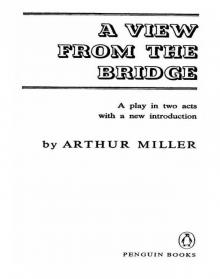 A View From the Bridge: A Play in Two Acts
A View From the Bridge: A Play in Two Acts Broken Glass
Broken Glass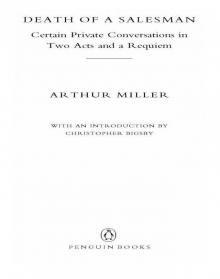 Death of a Salesman
Death of a Salesman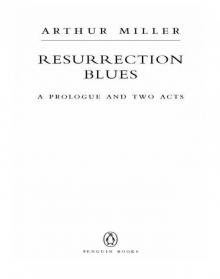 Resurrection Blues
Resurrection Blues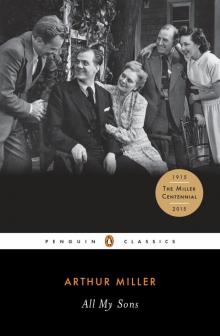 All My Sons
All My Sons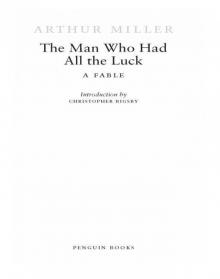 The Man Who Had All the Luck
The Man Who Had All the Luck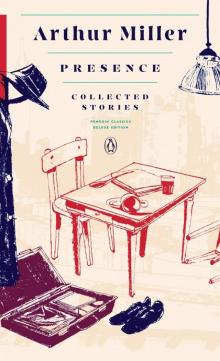 Presence: Stories
Presence: Stories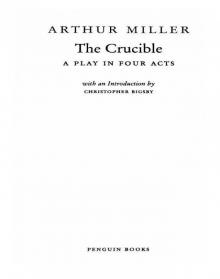 The Crucible
The Crucible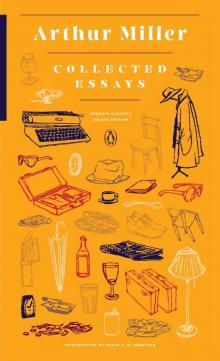 Collected Essays
Collected Essays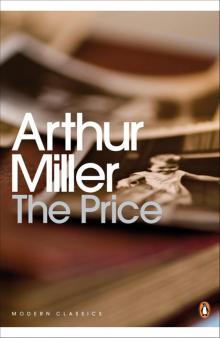 The Price
The Price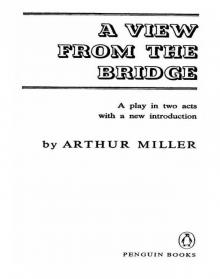 A View from the Bridge
A View from the Bridge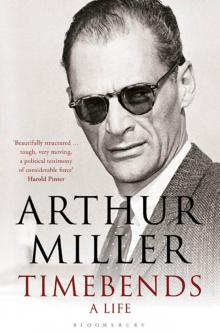 Timebends
Timebends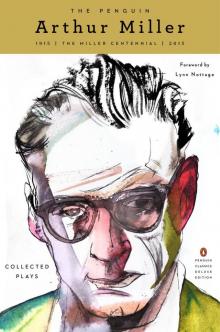 The Penguin Arthur Miller
The Penguin Arthur Miller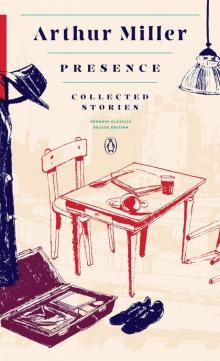 Presence
Presence